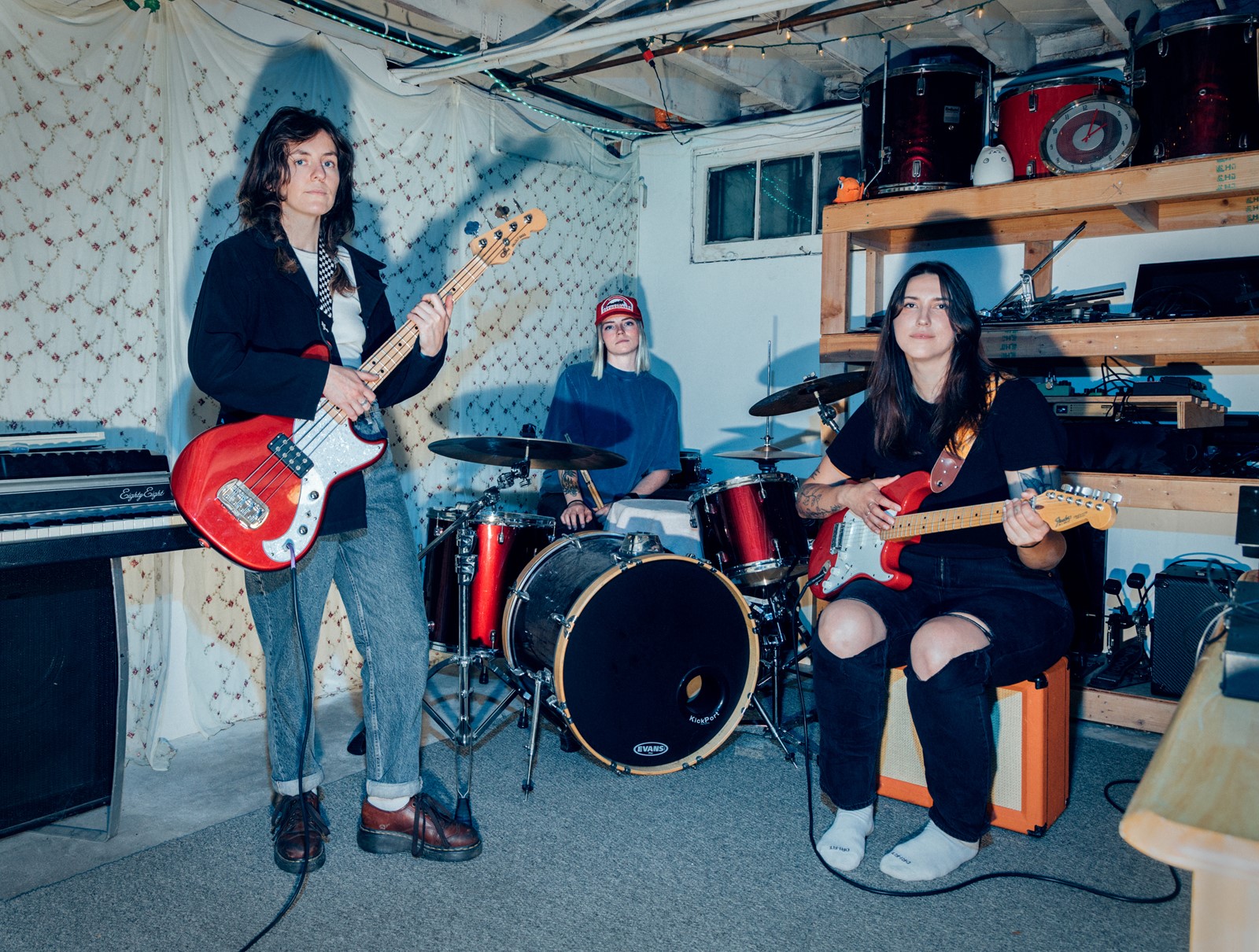
Teal and orange lights flashed across a makeshift concert hall in a Glendale basement as nearly 100 people squeezed into the small space. Looking out on the crowd assembled in their home, one blooming Denver band knew they never wanted to let go of that feeling.
The basement’s concrete walls should’ve distorted the music, but the packed room — decorated with strings of lights, scrap metal concoctions and artwork — made it sound warm instead, said Bridget Hartman.
Hartman plays bass for Barbara, an all-woman music trio that refuses to be defined by a single genre.
“I can still see myself in the basement with the lights, and I remember us blowing ourselves away,” Hartman said. “That was the moment I knew.”
Barbara is marked by transformation — the merging of three musicians into one cohesive band identity, improvised moments becoming permanent fixtures of the band’s sound and the entirety of their bounce-ideas-off-the-wall songwriting process.
Three years after that house concert in May 2022, the trio is quickly growing in the Denver music community.
‘We’re just letting all of our influences speak’
“With the pandemic, after things closed down, a lot of bands … didn’t come back,” said Maggie Moody, a talent buyer at the Hi-Dive bar and music venue in Denver. “Barbara was one of the bands that was on my radar after we reopened.”
Moody said Barbara grew fast. The trio only played one or two support slots before taking to the stage as the main act.
“The beauty of Hi-Dive is that it’s the place to see bands grow, both local and national,” Moody said. “It’s the spot bands hit before they blow up, before they sell out the Bluebird and the Ogden. … We get to see these local bands on their journey to getting bigger.”
The band was born from a combination of college burnout and three women trying to rediscover their passion for music, said Camilla Vaitaitis, the group’s guitarist and lead vocalist.
Vaitaitis, Hartman and Anna Panella, the drummer of the group, graduated together from the University of Denver, where they studied jazz and classical music. All three were living together when the COVID-19 pandemic hit.
That’s when they started messing around in their basement, strumming cords and riffing lyrics together, Hartman said. Before they knew it, they had an album’s worth of songs.
“What started as a fun thing has now become the center of our worlds,” Vaitaitis said.
The three women named the band “Barbara” because they wanted it to have its own identity and serve as their collective persona, Vaitaitis said.
Barbara played music from its debut album, “Escape Artist,” at the pivotal house party and officially launched it in September 2022 with a live performance inside Twist & Shout Records.
The group released its sophomore album, “So This is Living,” in April.
Vaitaitis said Barbara’s first album was an exploration of what the band could do together. Now that they’re comfortable, they’ve had a chance to experiment with their sound and let their influences speak, she said.
Panella, who’s from Chicago, has a deep love of hip-hop and rap that the group often references for audio production and cadence. Similarly, Vaitaitis’ background with Brazilian music and Hartman’s love of Afro-jazz have both
influenced multiple songs on the band’s new album.
Hartman described the band’s sound as a mix of “spirit of the beehive” and echo chamber melodies with psychedelic rock influences. The band is “wobbly and dreamy” to their core.
“With Barbara, it doesn’t feel like it’s possible to burn out,” Vaitaitis said. “I know anything’s possible, but when you’re making art with your best friends in the world, and you get to travel to cool places and meet amazing people and make this album that you’re so proud of … I could do this forever.”
The mixing-pot writing process
Barbara’s sound is constantly evolving, even as they record.
Vaitaitis said each song starts as a “seed of tune” — maybe someone pitches a chord progression, lyrics, a bass line or a drum part — that the group starts building off of.
“It kind of feels like we’re putting together a puzzle that already exists, because there are moments where … it just clicks,” Vaitaitis said. “It’s like it’s destined to be, and we’re searching to find it while we’re writing. Once the whole collective trio gets our voices in there, that’s when it really starts to feel like a Barbara song.”
But even after the song is written, the sound continues to change and grow, according to Connor Birch.
Birch, who’s part of the Denver-based band Flaural, worked as a producer and audio engineer on Barbara’s most recent album. Band members spent a lot of time during the recording process experimenting with the sound, Birch said. As they tweaked music arrangements or overlaid audio effects, things clicked into place and contributed to the identity of the record.
One change could shift the voice and direction of the whole album, he said.
“Those three have their background in jazz, which is based on improvising with different people and instruments,” Birch said. “They came in not knowing their limitations or how big they could dream for the album. As we worked together, we started to open up and explore that.”
At the same time, Barbara’s music remains thoughtful and accessible, Birch added. It’s not complicated for the sake of being complicated, but neither is it shallow.
“I hope people can relate to us and feel like they’re not alone,” Vaitaitis said. “There’s a lot of themes of anxiety or escaping anxiety, or overthinking and not knowing what’s coming. And I think these are just all universal feelings, and the best way we know how to process them is to write music.”


 PREVIOUS ARTICLE
PREVIOUS ARTICLE
